
There are a number of ways to search within Jim2:
▪search the Nav Tree
▪use the Find panel
▪use the Search Ribbon field
▪click within a list and start to type
▪click in the stock grid of an object and select Ctrl+S
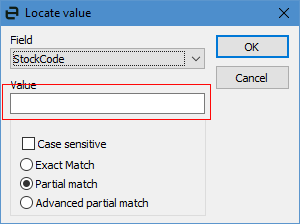
This allows you to search in selected fields.
Search the Nav Tree
At the top of the Nav Tree is an entry field for searching within Jim2.

 |
For Search to work, some or all of the options must be ticked.
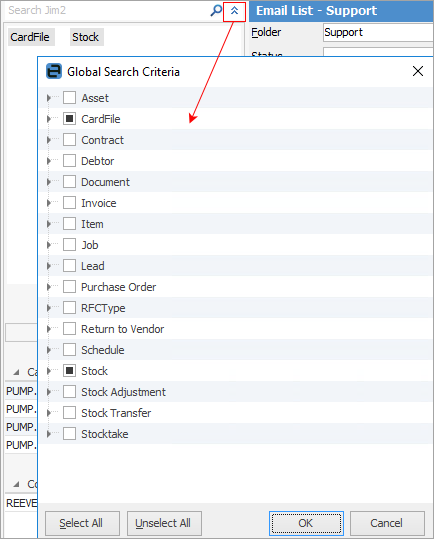 |
There are a few different ways to use this search function:
▪a global search
▪a selective mode to search in more specific areas of Jim2
▪a shortcut mode to quickly search in only one area at a time
▪a wildcard search.
Begin typing in the Search Jim2 field, click the magnifying glass and Jim2 will display anything that matches the letters entered. The same thing may appear in the Nav Tree a few times. This is because Jim2 will return everything that matches any part of what has been entered.
 |
Global search means searching the entire database, which is the slowest way to search in Jim2, and will also produce more results. |
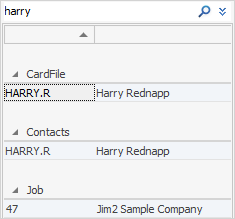
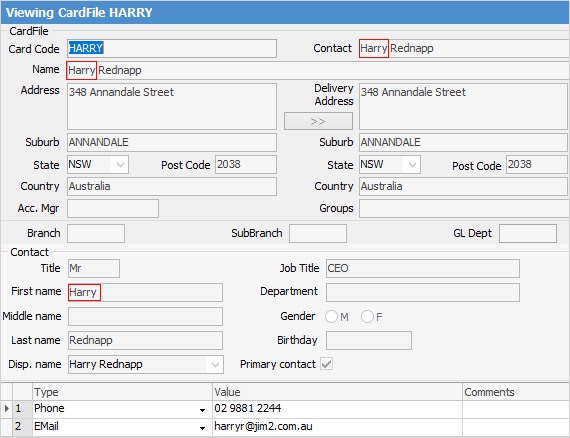
Select the  icon in the search bar at the top of the Nav Tree. The search area will extend vertically to display as follows.
icon in the search bar at the top of the Nav Tree. The search area will extend vertically to display as follows.
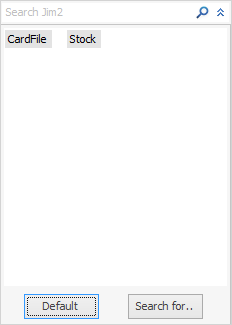
CardFile and Stock are displayed by default, however any combination of objects can be chosen. It is possible to narrow the search down very specifically. Each area in the search criteria has further options under each heading. Make the choices, then click OK. Enter text into the Search Jim2 field and click the  icon to perform the search.
icon to perform the search.
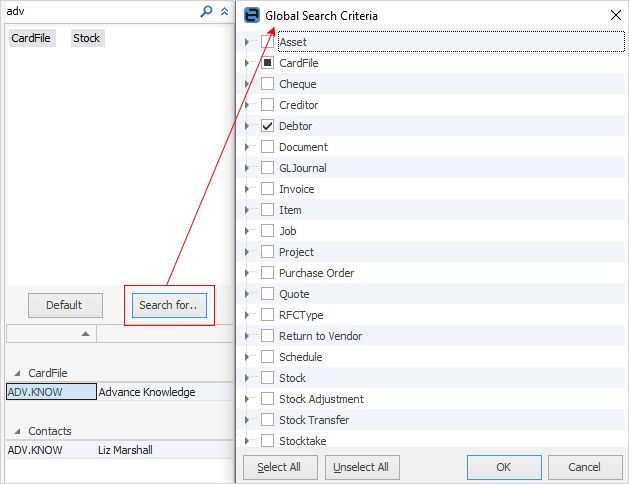
The results of the search will appear below the search field in the search results area.
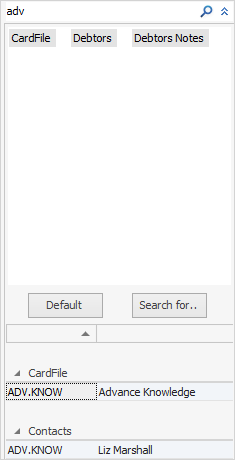
If more room is required to view the results, click the  icon at the top, which will collapse the selective mode area and increase the size of the results area.
icon at the top, which will collapse the selective mode area and increase the size of the results area.
Full list of searchable areas within the Nav Tree
Area |
Choices |
Asset |
Asset |
CardFile |
CardFile CardFile Email CardFile Notes |
Document |
Documents |
GL Journal |
General Journals |
Invoice |
Invoices |
Item |
Item Item Notes |
Job |
Job Job Comments Job Email Job Stock |
Project |
Project Project Comments Project Email Project Notes |
Purchase Order |
Purchase Purchase Comments Purchase Email Purchase Stock |
Quote |
Quote Quote Comments Quote Email Quote Stock |
RFC Type |
RFC RFC Comments RFC Email RFC Stock |
Return to Vendor |
RTV RTV Comments RTV Emakil RTV Stock |
Schedule |
Schedule |
Stock |
Stock Stock Detailed Description Stock Notes Stock Serial Number (includes GTI number) Vendor Stock |
Stock Adjustment |
Stock Adjust Stock Adjust Comments Stock Adjust Email Stock Adjust Stock |
Stock Transfer |
Stock Transfer Stock Transfer Comments Stock Transfer Email Stock Transfer Stock |
Stocktake |
Stocktake Stocktake Comments Stocktake Email Stocktake Stock |
 |
If the user's security level prevents access to certain areas of Jim2, those objects and checkboxes will not appear in the list. |
To search within one area of Jim2, eg. in CardFiles, it may be easier to use a shortcut in the search field. For example, to find all cardfiles in the name of Jones, enter c:jones. Jim2 will expand the c to CardFile:, then search for jones.
 |
Search within Jim2 is not case sensitive. |
The results will show any cardfile with Jones in it. Here's an example of searching for cardfiles with the word happen in them:
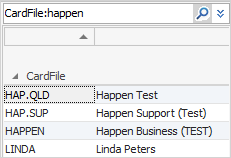
Shortcut |
Expands to |
Area that is searched in |
|---|---|---|
a: |
Asset: |
Assets |
c: |
CardFile: |
Cardfiles |
d: |
Document: |
Documents |
e: |
Item: |
Items (or whatever Items has been changed to in Options) |
i: |
Invoice: |
Invoices |
j: |
Job: |
Jobs (or whatever Jobs has been changed to in Options) |
k: |
Stocktake: |
Stocktake |
m: |
Project: |
Projects (or whatever Projects has been changed to in Options) |
p: |
Purchase: |
Purchases |
q: |
Quote |
Quotes, Leads (or whatever Quotes has been changed to in Options) |
rfc: |
CustReturn: |
Return from customer |
rtv: |
VendReturn: |
Return to vendor |
s: |
Stock: |
Stock |
sa: |
StockAdj: |
Stock Adjustments |
sn: |
Serial: |
Serial numbers. Enter either a full serial number, or part of one and Jim2 will return all stock codes with any of those numbers. |
t: |
Transfer: |
Transfers |
vs: |
VendorStock: |
Vendor stock |
 |
The full text from the Expands to column in the above table can be used if preferred. |
Jim2 supports wildcard search. If Jim2 sees that you have entered a wild card like %, it will send that exact request straight to SQL server.
%SEARCH% will return anything with the word SEARCH in it. We have also retained simply using the key word, without %. So, SEARCH will find anything with SEARCH in it.
SEARCH% will return anything starting with SEARCH.
If you want to find something that looks for: This Search is ridiculous, the search will be %SEARCH%RIDIC%.
See https://docs.microsoft.com/en-us/sql/t-sql/language-elements/like-transact-sql?view=sql-server-ver15 (copy and paste into a browser) for more information.
Right click anywhere within a list or within an object to bring up the menu and select Show Find Panel.
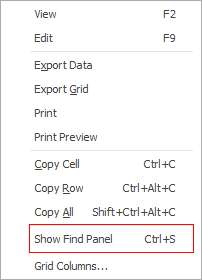
Once selected, the Find panel will be displayed below the header of a list or object.
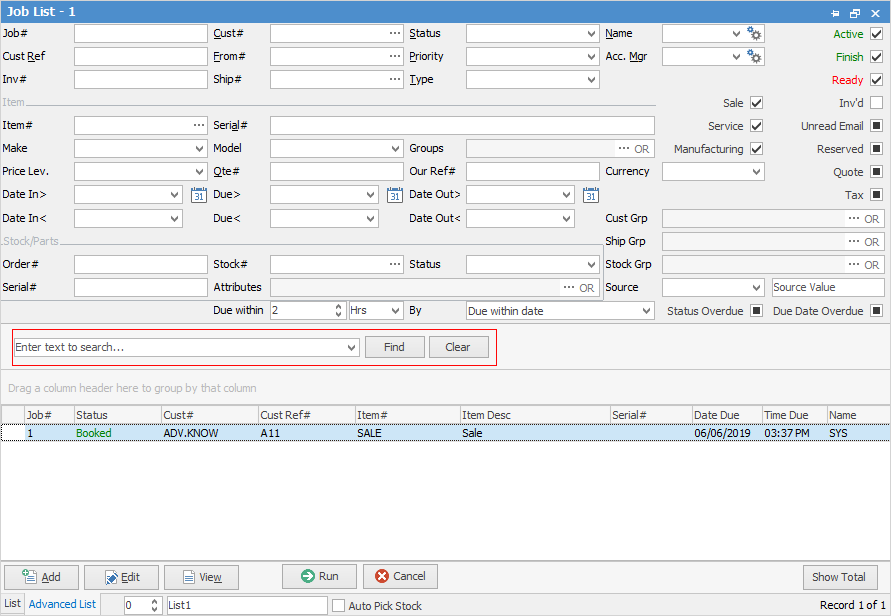
 |
The Find panel will remain in a pinned list but will disappear from an unpinned list on log off. |
Enter a search value and the list will update to show only the objects in the list that match.
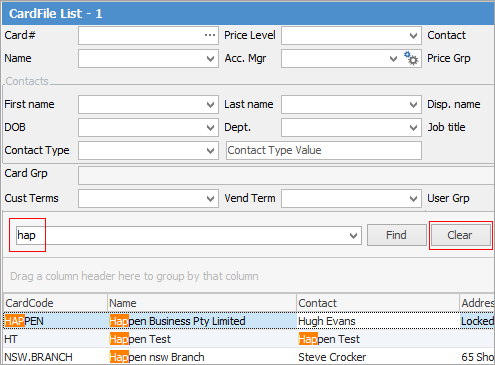
Click Clear to return to the full list.
Enter a search value within an object and this will bring up any match, including anything within the Comment grid of that object.
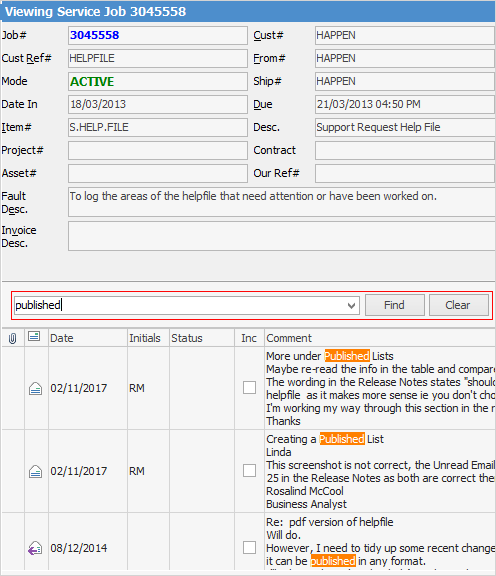
This is great for quickly finding things such as a specific job based on its Item or fault description within a large list of jobs.
The entire ribbon can be searched via Search Ribbon in the Quick Access Toolbar. Position the cursor in the field (or press Ctrl+L) and begin typing. Jim2 will bring up anything on the ribbon that matches the letters entered, allowing for quick access to the ribbon object required.
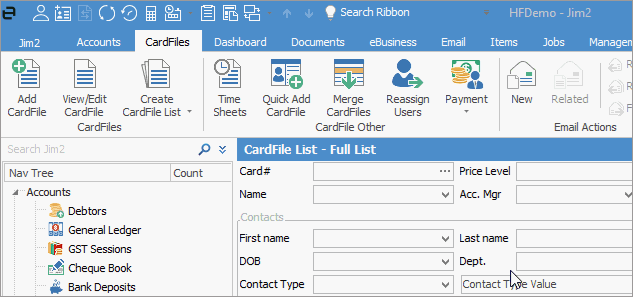
Search using intuitive type within lists
Throughout Jim2 the use of intuitive (or predictive) type is quite prominent. Intuitive text is used where a keystroke results in a prediction of a word or sequence of words to be displayed. Place the cursor in any field in a list/object and begin typing. Jim2 will highlight the first entry within the list that uses the letters entered. In this example, begin typing Bri:
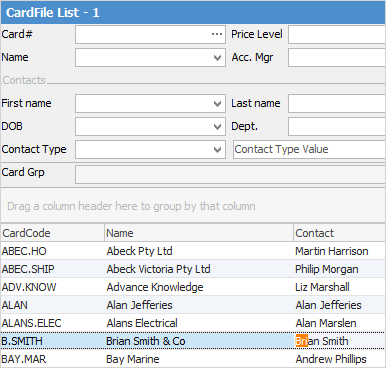
Press Ctrl+Down Arrow on the keyboard to find the next matching in the list.
Further information